



The Mekedatu dam dispute highlights Karnataka’s push for drinking water and hydropower versus Tamil Nadu’s fears of reduced flow and legal violations. Environmental concerns in the Cauvery Wildlife Sanctuary add pressure. With the Supreme Court involving the CWMA, resolution depends on cooperative federalism and sustainable urban water options.
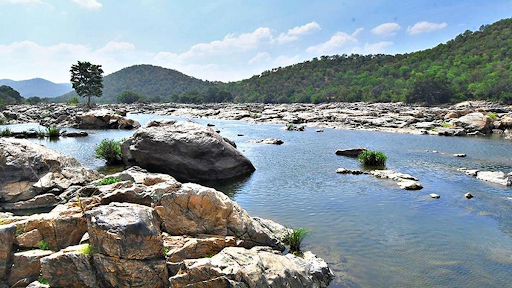
Copyright infringement not intended
Picture Courtesy: THE HINDU
The Karnataka government to submit a Detailed Project Report (DPR) to the Centre on the Mekedatu dam balancing reservoir across the inter-State river Cauvery.
It is a multi-purpose infrastructure plan proposed by Karnataka.
It involves building a dam across the Cauvery River, near the confluence with its tributary, the Arkavathi, in the Ramanagara district of Karnataka.
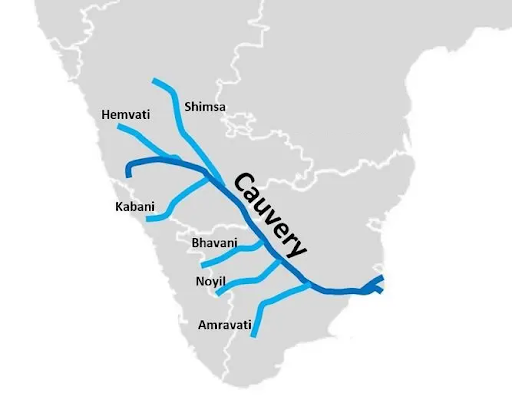
It is a major point of contention between upper riparian Karnataka and lower riparian Tamil Nadu, originating from the century-old Cauvery water-sharing dispute.
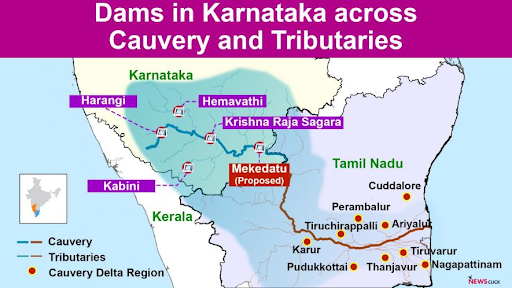
The Cauvery dispute is a long-standing conflict between Karnataka and Tamil Nadu over the sharing of water from the Cauvery River.
The dispute stems from 19th and early 20th-century agreements, exacerbated by increased water demand for agriculture, industry, and domestic use.
The conflict involves issues like water allocation during normal and drought years, construction of dams, and has led to legal proceedings, political tension, and public protests.
Current Legal Framework
Cauvery Water Disputes Tribunal (CWDT) Final Award (2007): Allocated water based on a total availability of 740 TMC in a normal year.
Supreme Court Verdict (2018)
The SC modified the CWDT award, citing Bengaluru's drinking water needs and the availability of groundwater in Tamil Nadu.
|
Inter-State River Water Disputes Act, 1956 The Inter-State Water Disputes Act creates the legal structure for resolving water disputes between states. Empowered by Article 262, Parliament legislated this Act, allowing the central government to establish tribunals for adjudication. |
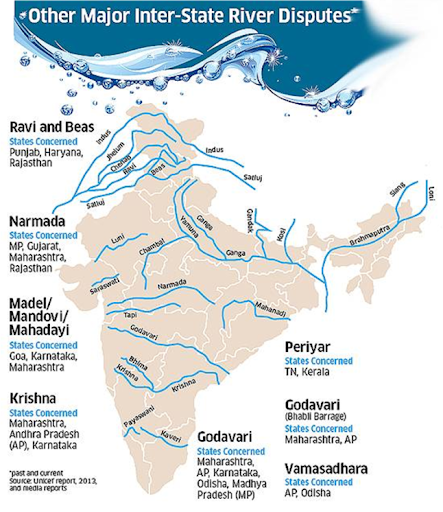
Violation of Riparian Rights
Tamil Nadu, a lower riparian state, argues Karnataka's proposed large reservoir is a unilateral act, violating the Supreme Court's "national asset" declaration of the Cauvery and impacting Tamil Nadu's dependent water flow.
Threat to Agriculture
Tamil Nadu's Cauvery delta, a key agricultural region, fears the dam will disrupt timely water for paddy crops, especially during the monsoon, threatening millions of farmers' livelihoods.
Historical Mistrust
Karnataka's past failures to release mandated water during droughts have created deep mistrust, making TN skeptical of assurances that a dam will only store surplus water.
Legal Requirement for Consent
Tamil Nadu argues that any project on an interstate river needs prior consent from the lower riparian state, which is missing.
|
For Karnataka |
For Tamil Nadu |
|
Pros: Addresses Bengaluru's water scarcity, reduces dependence on water tankers, generates clean energy, creates construction jobs. |
Cons: Creates anxiety among delta farmers over irrigation security, threatens crop stability and agricultural economy. |
|
Cons: Displacement of local communities in the submergence zone, high financial cost. |
Pros: Karnataka argues that a regulated water flow from the reservoir would ensure more predictable releases, even in lean years, benefiting TN. |
Strengthening Institutional Mechanisms: The Cauvery Water Management Authority (CWMA) and the Cauvery Water Regulation Committee (CWRC) must be empowered as neutral, data-driven bodies.
Data Transparency: A transparent, real-time water accounting system using modern technology (e.g., telemetry systems) is essential.
Basin-Wide Planning: The dispute necessitates shifting from state-centric projects to integrated river basin planning, assessing the environmental impact of all projects on the river's health.
Focus on Water Efficiency: Both states must invest in long-term solutions.
The Mekedatu dam project exemplifies the conflict between Bengaluru's urban water needs and Tamil Nadu's agricultural concerns, requiring a collaborative resolution guided by equitable distribution, ecological sustainability, and transparent data-sharing under the Cauvery Water Management Authority to uphold cooperative federalism.
Source: THE HINDU
|
PRACTICE QUESTION Q. Inter-state water disputes are becoming a major test for cooperative federalism. Critically analyze. 150 words |
It is a proposed multi-purpose balancing reservoir project by Karnataka on the Cauvery river, near Mekedatu. Its main goals are to store water for Bengaluru's drinking needs and to generate 400 MW of hydroelectric power.
Tamil Nadu fears that the dam will give Karnataka control to restrict water flow, harming agriculture in its delta region. Legally, it argues the project violates the Supreme Court and CWDT awards and that Karnataka cannot build it unilaterally without the consent of the lower riparian state.
The CWMA is a statutory body established by the Centre on the Supreme Court's direction. Its primary role is to implement the water-sharing formula. The Detailed Project Report (DPR) for the Mekedatu project must be approved by the CWMA before any construction can begin.

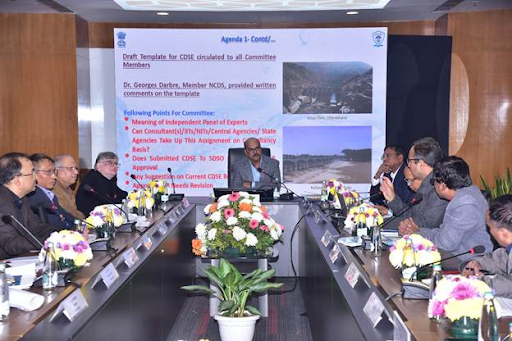

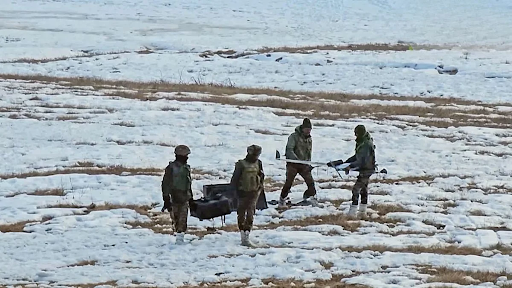

© 2026 iasgyan. All right reserved